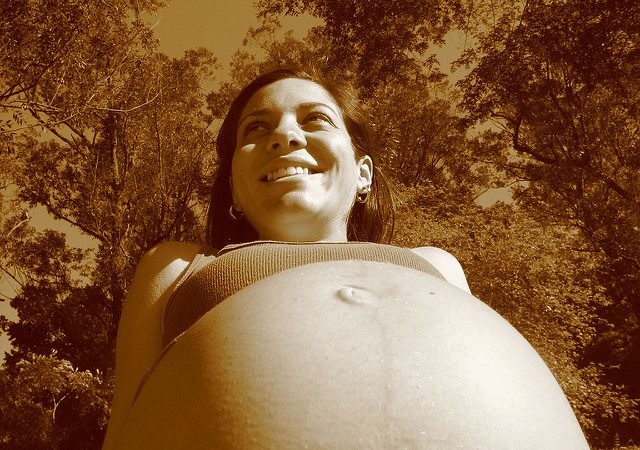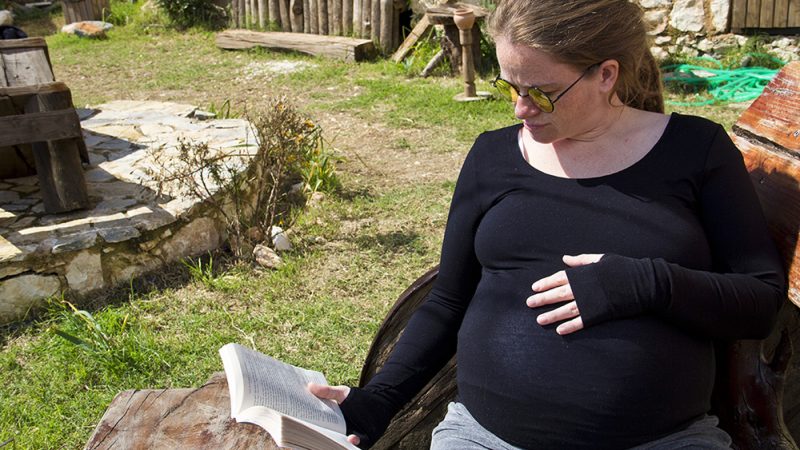
Pregnancy with a high BMI – A Q&A with Clare Murphy
We were joined by Clare Murphy of the British Pregnancy Advisory Service to talk about the problems encountered in pregnancy by mothers with a high BMI.
Image: Rafael Praia CC BY-NC-ND 2.0
Hi Clare, great to have you here, thanks for coming! I’d love to hear a bit about your work at the BPAS.
Clare: Thanks very much for inviting me here! I am no clinician/scientist, but I am very interested in the communication of risk in pregnancy and think there are particular problems when it comes to issues around BMI.
By way of introduction, I run advocacy at the British Pregnancy Advisory Service – we are primarily an abortion provider, but we also have a charitable remit to campaign and educate around women’s reproductive choice more generally, and have a general mantra of trusting women to make their own choices in pregnancy – from what contraception they use to how they give birth.
My position is that women need good evidence on which to make those choices, and my concern is that when it comes to BMI the risks are often overstated and evidence poorly communicated.
PSG A: Which risks do you find are the “problem” ones, in terms of being the ones you hear being overstated again and again?
Clare: I think it comes out in a couple of ways. The one that I find really sinister is the increasing suggestion that obese women are somehow pre-programming their foetuses to a lifetime of obesity by virtue of the environment in the womb and epigenetic changes.
The evidence base for this is extremely slim, and indeed intergenerational obesity is far more likely to be the result of shared genetics and lifestyles. But that didn’t stop it becoming a key part of a recent report from the Chief Medical Officer, which almost implied that women above a certain weight shouldn’t get pregnant. We are aware of obese women who have struggled to get a doctor to remove an IUD on the basis that they should lose weight before they conceive.
I am not saying there are no issues with BMI in pregnancy but the way they are communicated today seems beyond the evidence base.
PSG G: Wow re the IUD. That’s awful!!
PSG A: That’s shocking!
PSG C: It is pretty shocking how some doctors are taking away body autonomy from woman. I now live in Northern Ireland where it’s still illegal to have an abortion unless the mother’s life is in danger. My friend had to go to London for IVF to prevent a serious genetic condition being passed to the baby. It is a joke.
PSG D: How is that even legal? Removing an IUD is her choice. How can a doctor play ‘God’ like that- it’s not his choice?
PSG B: Totally agree. It also seems the BMI at which they start overstating the risks can be quite arbitrary.
Clare: One of the things I find interesting is the fact that there is now a bit more scrutiny of some of the alcohol guidelines for pregnant women and people starting to question what the evidence base is for a policy of abstinence, because as we know there is no evidence that low levels of alcohol in pregnancy cause foetal harm.
And I think there has been some kick back against that, but we haven’t seen the same with some of the messages around BMI.
I do wonder whether it is a socio-economic issue and whether that group of women is not particularly well represented within mainstream media discussions.
Q: Do you have any information on studies about using birth pool with a high BMI? Is the reluctance from health care professionals to allow bigger mums in the pool based on any actual research or reasoning?
Clare: Birth pools are a good example. I think one of the problems obese women find is that that are automatically treated like a problem rather than an individual with different needs and preferences, and that with continuity of care actually maybe some of those preferences could be fulfilled. it seems there is a very one size fits all approach to women with higher BMIs, and not enough tailored care.
PSG G: I’m not sure there’s much tailored care in maternity anyway tbh. One size fits all certainly seemed to be my experience 4 yrs ago.
PSG E: It sounds about right. The consultant I was under decreed continual monitoring throughout labour without bothering to see me.
PSG C: Absolutely. During my first pregnancy I asked about the pool and was told no. I asked why. The first doctor said because the baby would probably get stuck, and the second said because of my BMI. No good reason. I was ‘allowed’ a bath though.
PSG D: As a midwife myself, it’s down to the individual woman’s circumstances – not based on weight alone, however weight of the woman is to be considered because, dependent on the hoists used (if any) it can mean some women can’t actually safely be manoeuvred out of the pool. There isn’t any current research on high risk pool births regarding BMI.
All women should have choice – and not be told she ‘can’t have’ a pool birth – and understand that as long as she’s been given an informed choice it’s not down to the hospital to then take responsibility if she goes against advice. Just because a woman has a high BMI doesn’t mean she is definitely going to experience adverse situations.
Of course many midwives practice defensively – they follow doctor’s orders because they are scared of the liability. It’s a scary place to be advocating for your woman in the absence of evidence to prove your point! Regardless of a woman’s choice, internally, a Trust can discipline a midwife for putting the woman and/her baby at risk without a complaint from the woman.
Maybe this is what needs tackling – the stigma surrounding defensive practice and ‘risks’. Women regardless of BMI are not stupid and can decide what they want for their birth, and regardless of BMI it should be supported.
PSG E: But with hoists it’s a weight limit rather than a BMI issue. The hoist’s limit is still 180kg (or whatever) no matter what the height or BMI of the person being lifted. The fact it’s BMI and not a flat weight thing can be frustrating.
Q: What are your thoughts on BMI as an indicator of risk in general? It is such a general measure and doesn’t necessarily fit all body types. For instance, my husband fits into the obese category, but he carries a large amount of muscle mass in his legs, so while his BMI is high he isn’t what you would call obese.
Clare: I think there are broad problems with the use of BMI as an indicator and maternity is no different. And the problem for women with a high BMI is that it then sets them off down a very specific pathway of care where they may feel they are not left with many choices and their autonomy is undermined.
I think the information available on the Big Birthas website is just brilliant, especialy its analysis of risk. I hope it empowers more women to feel they can ask questions and challenge assumptions that are being made about them.
Q: I know that some of the clinical concern about weight gain and pregnancy is because it’s the life-stage where women are most likely to become obese (and struggle to lose the weight afterwards). Do you know of any good research on interventions to help women manage their weight during and/ or after pregnancy?
Clare: There are none that have been shown to markedly effect weight or foetal outcomes.
This is the other issue – that women are often being told to take part in programmes for which the evidence base is lacking and which may also be quite stigmatising in itself. For clarity this is not to say there are not associations between maternal obesity and undesired outcomes – but that while the risk of those outcomes (eg stillbirth) goes up, the overall risk remains small.
And I worry that is not well communicated.
PSG L: I’ve seen these:
- The UPBEAT trial: Developing a complex intervention for diet and activity behaviour change in obese pregnant women
- The LIMIT trial: Limiting weight gain in overweight and obese women during pregnancy to improve health outcomes
PSG M: These are the NICE guidelines on weight management in pregnancy: https://www.nice.org.uk/guidance/ph27
PSG L: Thanks for that reminder. Lots of interesting stuff in here!
Such as “The expert panel discussed whether there had been any further work on appropriate weight gain ranges in pregnancy since the original guidance was published. They concluded there is still no UK evidence-based guidance in this area and it remains an urgent research need.”
The guidance is rather old (2010) and definitely overdue for review! In 2013 NICE’s review team suggested it was revisited in three years (Jan 2016) when the results of three studies should be known (LEAP, LIMIT and UPBEAT). I’ll contact NICE tomorrow to find out why there has been no further action.
Q: Are you aware of any trusts who are taking positive action vs restrictions and listing of risks? And are care providers equipped to give the relevant information to patients? I found I was running into a wall of risks but had to do my own research when I asked for them to back the risks up.
PSG M: I’m really interested in the differences between trusts. I’m on a Gestational Diabetes group and the different advice between different trusts is shocking, including the lack of knowledge of some midwives. My hospital was brilliant and mostly followed NICE guidelines. Except when it came to testing for diabetes after pregnancy when they insisted on using the GTT test, which NICE guidelines say specifically shouldn’t be used post-partum (I guess because most people don’t want to fast for 14 hours while breastfeeding/looking after a 6-week-old!).
Clare: I know there are many individual midwives who are concerned about this and working to improve care for women. But I am not sure about this at a trust level.
PSG E: It was the midwife doing my antenatal classes who gave me the confidence to make an appointment with the consultant myself to discuss things. She was a larger lady herself so maybe that coloured her views.
Clare: That is good to hear and certainly it’s my feeling that there are many midwives trying to do their best by women, but who also sometimes feel constrained by policies and procedures which can prevent them providing the care and advice that is tailored to the individual woman before them. It’s difficult.
Clare: It’s interesting that there is increasing preoccupation with maternal mental-health but no-one seems to have any problems with essentially telling women with higher BMIs that they are putting themselves and their babies at risk.
PSG M: Yes! trying to support maternal mental health while at the same time saying you are endangering your baby!
PSG M: Really interesting about the lack of evidence of programmes for weight management. I think it contributes to taking away the autonomy of women. So often when you are pregnant you are treated as if you aren’t an intelligent human being but a vessel.
PSG C: During my last pregnancy I was put in the ‘weigh to a healthy pregnancy’ scheme (don’t know how they came up with such a patronising title). They wanted to install scales in my house (I declined), I saw a special midwife in pregnancy (don’t know what the difference was but the continuity was nice) and a dietician called me a few times. I didn’t gain too much either pregnancy but didn’t find the scheme helpful, just a way to make me feel different.
Clare: There is huge focus on pregnancy planning these days – and being pregnancy fit – and often not much recognition that many pregnancies are unplanned (that is my area of work).
I understand that in an ideal world all women would enter pregnancy with a BMI of 22, alcohol free, smoke free and choc-a-bloc with folic acid, but that is not the reality for many and I think we have to treat women as they are, not how we think they “should” be.
PSG H: Even women who wouldn’t consider terminating a pregnancy would never admit to a HCP that it’s unplanned. My first was a surprise and even though my subsequent children were planned I wouldn’t say I was perfectly pregnancy ready.
Clare: Yes, and the irony is that women are told they have to be pregnancy ready at the same time as they are told they need to get on with it before their fertility falls off a cliff. It’s very hard to win!
PSG F: Exactly! If I’d waited until I’d lost weight in order to be ‘pregnancy ready’ it would never have happened!
Q: If you could wave a magic wand and get any research funded, what would it be?
Clare: Great question! in a way I think there is far TOO MUCH research going on into how women’s behaviour – what they eat, drink, do – affects their pregnancy. We seem to have got ourselves to a point where increasingly we blame all sorts of negative outcomes on what women did or didn’t do during pregnancy. On alcohol (I know that’s not what we are talking about here but I think it is a good example) you wonder how many more studies will they conduct with null or few findings of significance!
For BMI, I would really like to see some proper qualitative work on women’s actual experiences. I think women’s voices have been completely lost.
PSG O: I have felt at times as if my body did not truly belong to me (or my baby) during pregnancy but became public property.
PSG M: Yes! the most difficult things to deal with in my pregnancy were my anxiety and gestational diabetes – mostly because I was really aware of all the research around how much I would be damaging my baby from cortisol and how he’d be more at risk of obesity/diabetes etc. I felt like my body was failing my baby because of all of the research…
Clare: It seems to me amazing that women with a higher BMI have become such a focus of public health concern, particularly around pregnancy, and yet you can count on one hand the number of research papers done on how they experience maternity care. Spoiler: it is overwhelmingly negative.
PSG J: How do you think some qualitative research could affect woman’s experiences? What sort of thing would be the most effective (or ineffective)? It often feels like it is very hard to influence health care professionals’ preconceptions……..
Clare: I think improving understanding of women’s experience of maternity care when they have a high BMI could help underpin better guidelines for communication of risk. I don’t think any HCP goes into this wanting to make women feel bad about themselves; but I also think we live in a climate where it is acceptable to have certain prejudices about obesity.
I am hoping to do some work looking at how we can better bring women’s voices into these discussions and ensure that public health messages are made with women and not just for them/about them.
I think to do that we do need a better understanding of the realities of pregnancy and pregnancy planning.
Clare: If I could say one last think before we wrap up, I do feel very strongly there needs to be a basic re-evaluation of some of the broader principles of risk communication in pregnancy more generally, and BMI is absolutely a case in point.
This isn’t about saying there aren’t risks – of course there are – but it’s about working out how we communicate those risks in a way that does not overstate them and gives the individual woman the information she needs to make the choices that are right for her.
PSG D: Yes. Funnily enough, RCOG and NICE have guidelines on how risk should be communicated. It’s funny how many HCPs don’t follow this and just scare the woman with ‘information’.
Clare: Exactly! But maybe there needs to be something BMI specific.
PSG G: So do we need to get NICE to review their guidance?
Clare: There is a lot that is good in the NICE guidance on risk communication more generally ie give people info in way that makes clear likelihood in a way that is meaningful; try and contextualise it etc – I just think sometimes that gets lost in translation. I do think women need to be armed with the information to be able to advocate for themselves and that is no mean feat.
Inspired? Wish that you could make a difference to what research is done? Why not come and join the Big Birthas Parenting Science Gang on our Facebook group?
Also, why not check out some of our other Q&A sessions. We’ve talked about;
- the issues facing mothers with a high BMI with Amber Marshall
- forest schools with Sara Knight
- babywearing with Rosie Knowles
and many more! You can see the entire list here: http://parentingsciencegang.org.uk/live-chats-with-the-experts/


